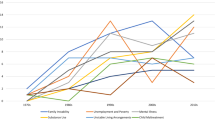Abstract
The purpose of this paper is to illustrate some of the ways in which the perceived pathways into homelessness are socially structured. We do this by examining the relative frequency of 11 different reasons homeless males and females cite for being homeless. Males were more likely to cite the following as their main reasons for homelessness: loss of a job, discharge from an institution, mental health problems, and alcohol or drug problems. Women were more likely to cite the following as their main reason for homelessness: eviction, interpersonal conflict, and someone no longer able or willing to help. Self-reported reasons for being homeless are also related to age, marital status, race, and being a veteran. As expected, they are also linked to receptiveness to treatment. Gender differences in reasons for homelessness may require different approaches to building helping relationships with homeless men and women.
Similar content being viewed by others
REFERENCES
Burt, M. A. (1992). Over the edge: The growth of homelessness in the 1980s. NewYork and Washington, DC: Russell Sage Foundation and Urban Institute Press.
Hopper, K., & Hamburg, J. (1986). The making of America's homeless: From skid row to new poor, 1945–1984. In R. G. Bratt, C. Hartman, & A. Meyerson (Eds.), Critical perspectives on housing. Philadelphia, Temple University Press.
Leda, C., Rosenheck, R., & Gallup, P. (1992). Mental illness among homeless female veterans. Hospital and Community Psychiatry, 43(1), 1026–1028.
Mechanic, D. (1999). Mental health and social policy: The emergence of managed care. Englewood Cliffs, NJ: Prentice Hall.
Randolph, F. L., Blasingsky, M., Leginski, W., Parker, L. B., & Goldman, H. H. (1997). Creating integrated service systems for homeless persons with mental illness: The ACCESS program. Psychiatric Services, 48(3), 369–373.
Rosenheck, R., Frisman, L., & Chung, A. (1994). The proportion of veterans among homeless men. American Journal of Public Health, 84, 466–469.
Rossi, P. H. (1989). Down and out in America: The origins of homelessness. Chicago: University of Chicago.
Shlay, A. B., & Rossi, P. H. (1992). Social science research and contemporary studies of homelessness. Annual Review of Sociology, 18, 129–160.
Susser, E., Struening, E., & Conover, S. (1989). Psychiatric problems of homeless men. Archives of General Psychiatry, 46, 845–850.
Tessler, R., Gamache, G., Rossi, P. H., Lehman, A. F., & Goldman, H. H. (1992). The kindred bonds of mentally ill homeless persons. New England Journal of Public Policy, 8, 265–295.
Tessler, R., Rosenheck, R., & Gamache, G. Comparison of homeless veterans with other homeless men in a large clinical outreach program. Psychiatric Quarterly, in press.
Author information
Authors and Affiliations
Corresponding author
Rights and permissions
About this article
Cite this article
Tessler, R., Rosenheck, R. & Gamache, G. Gender Differences in Self-Reported Reasons for Homelessness. Journal of Social Distress and the Homeless 10, 243–254 (2001). https://doi.org/10.1023/A:1016688707698
Issue Date:
DOI: https://doi.org/10.1023/A:1016688707698




